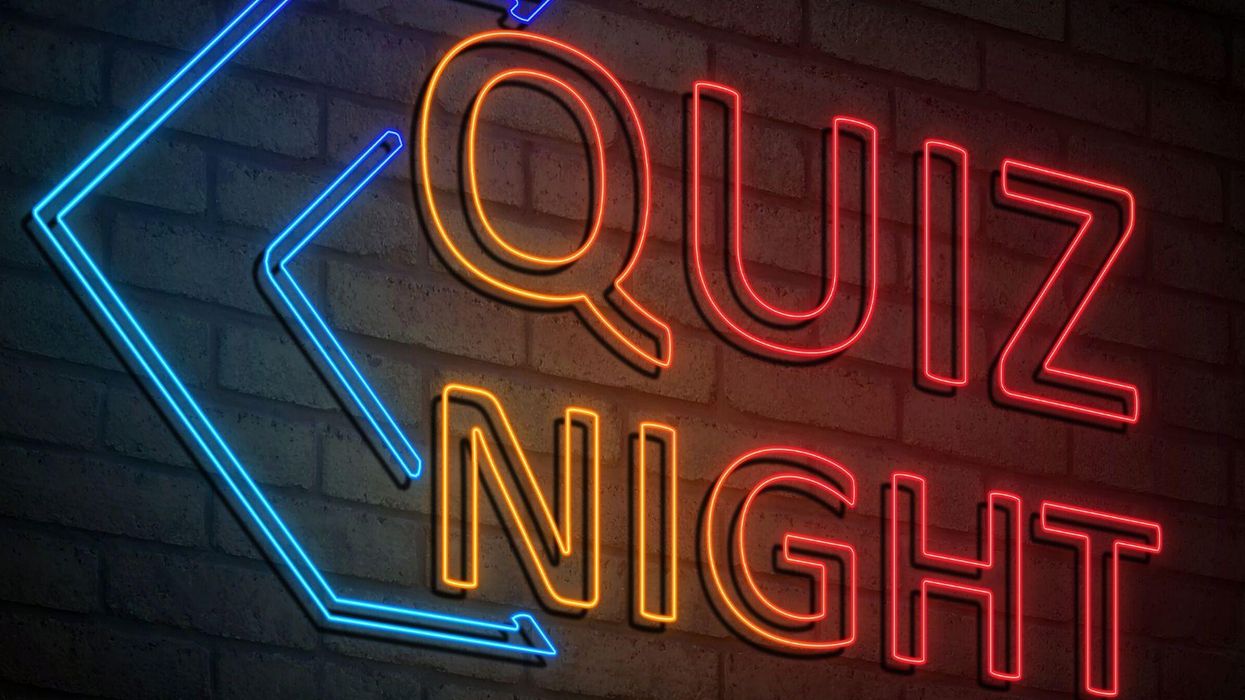News
Moya Lothian-McLean
Apr 14, 2020

iStock
Here’s a question for your pub quiz: who invented it?
The answer is: capitalism.
Or rather, the format of what we’ve come to recognise as the modern day pub quiz was created in 1976 by a savvy marketing duo, Burns and Porter, as a ploy to lure punters into pubs on quiet weekdays. At first, they had 32 teams on board. But at their peak, Burns and Porter were producing quizzes for around 10,000 teams per week, their success being such that TV shows even began commissioning them to provide questions for quizzes broadcast to the nation.
And while other countries obviously enjoy the thrill of a good quiz, the pub quiz is a uniquely British invention.
Indeed, there’s a passionate quiz culture in Britain that seems unmatched elsewhere. Host of quiz show Eggheads Jeremy Vine recently said that despite being immensely popular in the UK, it hasn’t been successfully sold abroad because the demand just isn’t there. "Britain is the most fanatically quizzy country" – which is why he says Eggheads is "very popular in this country" but hasn't sold to that many countries abroad.
In this country, knowledge and information is status. People love to know stuff.
Which all goes some way to explaining why during lockdown, so many have turned to virtual quizzes with their friends to pass the time. Google Trends reports that data from 29 March to 4 April shows the term “pub quiz” has the highest amount of search traffic in the last 12 months and alongside phrases like “virtual pub quiz” and “pub quiz questions 2020”. It’s become a breakout search.
Everywhere you look on social media, people are quizzing. It’s become such a norm to see screenshots of multiple grinning faces on a Zoom call there’s even memes dedicated to the trend.
“I never did many quizzes before lockdown,” says 23 year-old Elara, who now hosts a weekly pub quiz with her friends at their virtual Zoom pub “Quarantinos”.
Elara says hosting the quiz has become a “real obsession” and its popularity has now grown to about 20 teams per session, some of whom live together but often are just people messaging each other during the question rounds.
Teams that place first and second receive a donation to a chosen charity and an additional bottle of wine if they request it.
For Dom, 24, the quiz replaces a real-life tradition of pub trips.
"I’ve been going to the same pub quiz with school friends for years now, [although] now we’re all adults we can’t often get together to go,” he says.
I started doing lockdown quizzes the first weekend before lockdown officially came into play. We play over zoom, with one quizmaster and eight to 12 teams. The prize is hosting next week’s edition. Like Eurovision.
It’s not just the younger generations who are gathering around the monitor to spout facts about Henry VIII’s executed wives.
“I didn't do many quizzes before lockdown but it's been a nice way to keep in touch with family or classmates,” says 39 year-old Fozia, who has two children aged five and eight.
"With kids it's a good way to get them involved in Zoom chats, so ours have mainly been kid friendly. We do picture rounds involving movies, lots of random animal questions and some music or geography."
Alan Connor is the author The Joy of Quiz. He thinks part of the resurrection is down to how lockdown has led to people looking for a way to feel less isolated.
"I think all these virtual pub quizzes show us that the real thing is as much about company as it is about general knowledge," he said.
Martin, 34, also agrees that writing and running quizzes has allowed him to connect with older friends and family members he wouldn’t normally play with.
“Tailoring quizzes to several generations has been tricky and fun,” he says of the experience. "You want to get people making that really satisfying groan when they hear the answer, or when the answer is on the tip of their tongue; everyone needs to feel they have a chance. But you also might be dealing with people who know more Dean Martin than Dua Lipa and vice versa!"
He explained that getting the blend of questions right when everyone is part of such different cultural tides is part of the challenge.
"More than music or films or books, TV seems to be the biggest divider, among my older relatives anyway. But overall, it’s just lovely to hang out in a big group and feel you’ve spend significant time with people who are important to you."
Had such a fun time last night. Pub quiz via zoom with Some of my friends. I highly recommend it!! X— Kym Marsh (@Kym Marsh) 1586003875
But why the quiz? What is it about this specific format of delivering trivia questions that holds such comfort for Brits at times of crisis?
Alan Connor pointed out that quizzing has always been popular in times of crisis: "The BBC did wholesome wartime quizzes on subjects like air-raid warden protocol. Prizes were viewed with great suspicion. So while we’ve since developed our own big-money quiz culture, we’ve also always had this wholesome streak."
Asking newly minted quizzers and quizmasters alike, part of the answer seems to lie in the format, which allows large-scale socialising akin to a real life experience, but circumvents the awkward pauses and limited social cues that are pitfalls of video chats.
“The pub quiz format works really well in terms of lockdown,” says Elara, who attributes the structure of a quiz with allowing large groups to socialise without it getting out of hand.
“A lot of the bigger group Zooms I’ve done have either been too awkward or too chaotic, so a good bit of organised fun goes a long way”.
“It allows that same large socialisation [you get in real life] without being too messy,” she remarks.
Fozia agrees, saying it can be difficult to socialise with other families without the quiz format to help organise things.
We find it hard to see people in a group via Zoom with no structure, [especially] when we can be talking to up to four different families in terms of numbers.
For Robin, 26, virtual pub quizzes (and bingo) also inject familiarity and structure into his week, at a time when many are left at sea by massive upheaval.
“[Quizzes give me] a sense of regularity,” he says. “Every Monday and Friday has an event, as well as [offering] the chance to see friends I wouldn't necessarily have a one-on-one call with”.
Pub quizzes are free, they’re fun and most of all they’ve become a small beacon of comforting light entertainment during a period when the whole world has seemingly been upended overnight.
It may be trivia but these virtual quizzes are the furthest thing from trivial.
Top 100
The Conversation (0)













